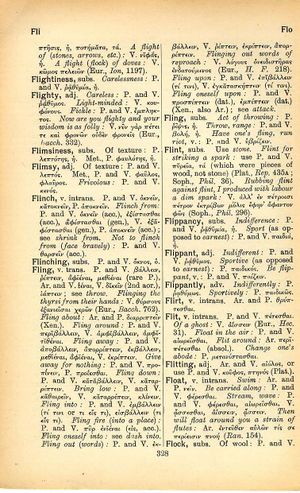flint: Difference between revisions
From LSJ
αἰὼν παῖς ἐστι παίζων, πεσσεύων∙ παιδός η βασιληίη → time is a child playing draughts; the kingship is a child's | a life-time is a child playing, playing checkers: the kingship belongs to a child | a whole human life-time is nothing but a child playing, playing checkers: the kingship belongs to a child | lifetime is a child at play, moving pieces in a game; kingship belongs to the child
(Woodhouse 3) |
(CSV4) |
||
| Line 1: | Line 1: | ||
{{ | {{Woodhouse1 | ||
| | |Text=[[File:woodhouse_328.jpg|thumb|link={{filepath:woodhouse_328.jpg}}]]'''subs.''' | ||
Use <b class="b2">stone.</b> | |||
<b class="b2">Flint for striking a spark</b>: use P. and V. πυρεῖα, τά (which were pieces of wood, not stone) (Plat., ''Rep.'' 435A; Soph., ''Phil.'' 36). | |||
<b class="b2">Rubbing flint against flint, I produced with labour a dim spark</b>: V. ἀλλʼ ἐν πέτροισι πέτρον ἐκτρίβων [[μόλις]] ἔφηνʼ ἄφαντον φῶς (Soph., ''Phil.'' 296). | |||
}} | }} | ||
Revision as of 09:40, 21 July 2017
English > Greek (Woodhouse)
subs.
Use stone. Flint for striking a spark: use P. and V. πυρεῖα, τά (which were pieces of wood, not stone) (Plat., Rep. 435A; Soph., Phil. 36). Rubbing flint against flint, I produced with labour a dim spark: V. ἀλλʼ ἐν πέτροισι πέτρον ἐκτρίβων μόλις ἔφηνʼ ἄφαντον φῶς (Soph., Phil. 296).

